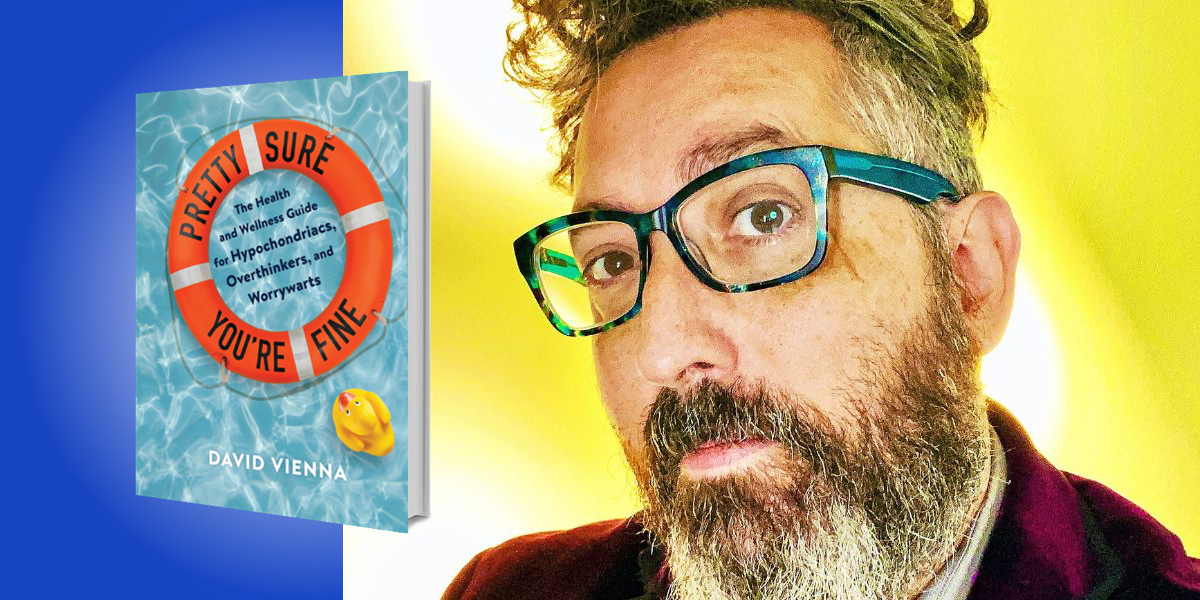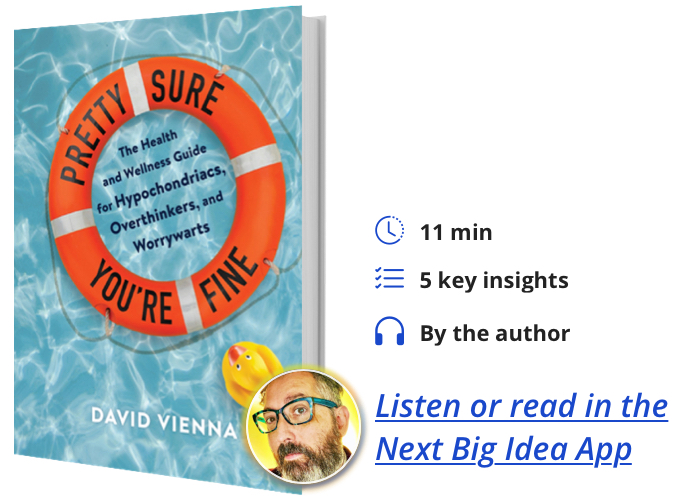David Vienna is an author, journalist, and the creator of The Daddy Complex, a parenting humor website where he chronicles misadventures with his wife and twin sons.
Below, David shares 5 key insights from his new book, Pretty Sure You’re Fine: The Health and Wellness Guide for Hypochondriacs, Overthinkers, and Worrywarts. Listen to the audio version—read by David himself—in the Next Big Idea App.
1. The stress of getting healthy is counterproductive.
We’d all like to think that personal health is, well, personal. But, unfortunately, it’s pretty much always been a business. From the early Greek Olympians competing for bragging rights to John Kellogg’s exclusive wellness spa in the 1800s to Dirk, your Peloton instructor, cheering you on, fitness has been incentivized beyond the obvious health benefits and, in most cases, monetized.
So, it makes sense that the gurus and experts want you to use their method, diet, or products, because it puts money in their pockets. To ensure that happens, they shout about how you need them to show you the path to a newer, better, magical you. With all of that shouting, the pressure to find the right fitness plan can be downright stressful. And because stress leads to mental and physical fatigue and can even increase hormone levels that make it harder to lose weight, it can impede your efforts. I’d call it a double-edged sword if the thought of accidentally cutting yourself didn’t stress you out further.
The truth is, it’s entirely probable that you’re OK the way you are. But if someone with perfect abs and a chiseled jawline is barking at you to be better, it can understandably add stress—or, at least, self-doubt—to an otherwise fine day. If you decide it’s time to make a change, however, I’m not saying that paying for a class or a meal delivery plan or even a book—ahem—is a bad move, just keep in mind that you might not land on the best technique for you right away. Exploring what works for you and what doesn’t is all part of the process and will alleviate stress that can make it difficult to get healthy.
“The truth is, it’s entirely probable that you’re OK the way you are.”
The good news is that improving your health, both physical and mental, can help with stress. It won’t alleviate it. I mean, c’mon, have you read the news lately? But, it can help you process stress better.
2. Find your own pace.
A number of luminaries, and even a study by Penn State, found that comparing yourself to others perceived as doing better than you can lead to poor mood and other negative results. So, don’t compare yourself to that neighbor who runs five miles every morning. Or that coworker who spends the entire lunch break at the gym. They’ve got their own routine and, quite frankly, no one likes a show-off, anyway.
If you’re new to an exercise regimen, there’s no way you’ll match your neighbor or coworker’s pace out of the gate. In fact, that’s why people who try to kickstart their routine by joining a fitness boot camp often suffer injuries. Yes, coming out of a fitness boot camp worse off than when you went in is not entirely uncommon. And I’m speaking as someone who blew out both my knees at one of those places.
The key to success is to be realistic about your abilities. If you want to eventually run a marathon, for example, start by walking a half-mile on your exercise days. When that gets easy, add a half-mile. When that gets easy, try jogging that mile. And so on. The same goes with dieting or even seeing a therapist. Cut calories slowly, not drastically. Understand that therapy takes months or years, not days. And ignore any ticking clock you may have set off in your brain that says you need to be in bikini shape by spring break.
3. Focus on routine, not goals.
If pulling yourself out of a mental funk or losing 10 pounds seems overwhelming, that’s because it is overwhelming. But, there’s a way to remove all of that whelm and that’s to view your chosen path (or paths) to improvement as a journey, not a destination.
“The finish line will sometimes be obscured by perfectly normal setbacks.”
You see, self-improvement of any kind will never look like a smooth graph. It’ll likely look like the jagged peaks and valleys of a hellish Tolkien-esque mountain range that thwart the mission of the rugged fellowship in their quest to… Hang on. I’m, getting off track.
To bastardize another writer, the course of true wellness never did run smooth. So, if you solely focus on the goal you’ve set, it’s sometimes easier to get discouraged. The finish line will sometimes be obscured by perfectly normal setbacks. Like, if you step on a scale and discover you’ve not only not lost any weight, but have actually gained a pound or two, you may feel the undeniable urge to throw the scale from your balcony and scarf down that leftover mac and cheese in the fridge. But, if you understand that the routine—daily self-care—is the real goal, you’re more likely to stick with it.
4. Trust your gut.
I don’t care what your gut looks like, you can usually trust it. If you feel OK, chances are you’re OK. And I don’t mean anyone who hears this is completely safe and well. I mean, you’ll likely find my book on a coffee table at your former college roommates’ house during an awkward party for the launch of his podcast. Please, don’t skip a doctor visit because of it. But, in a broad sense, you can trust your body to let you know if you need a change and if your body ain’t sending that signal, that’s fine.
But let’s say you get winded bringing in the trash cans or walking the dog. Or maybe you feel depressed in the evenings, almost like clockwork. There’s a very good chance you aren’t surprised by this. Not only that, it’s also a fair bet that you know you need to deal with it. And while it may feel better to have someone else be the one who suggests you “take better care of yourself,” you know yourself better than any drinking buddy or yoga classmate. Even if that yoga classmate has been dead-on about what’s coming up on Real Housewives of Atlanta.
“In a broad sense, you can trust your body to let you know if you need a change and if your body ain’t sending that signal, that’s fine.”
No matter how much you insist that you can flawlessly belt out Adele songs during karaoke, you know when you’re lying to yourself. So, if you feel like there’s a need to improve your mental or physical wellness, you’re probably right. And if that voice is the nagging one you try to numb with bad habits, you know that’s the voice to which you should be listening.
5. Accept that you might need help.
Now, if I’ve sounded flip, I certainly don’t mean to. Making a change in your life can seem scary, especially because some problems really are out of our control. Maybe your doctor warned of a health issue or you’re concerned about some kind of addiction. Or maybe you just can’t seem to get motivated. Admitting that you need help from someone else is not a weakness, but actually a pretty powerful move. To put it in perspective, let’s look at a version of seeking help you’ve almost surely tried already.
Not everyone can fix the engine in a Dodge Aries LE Sedan from 1988, butcher a whole cow, or perform back surgery. Those are jobs for which you’d seek someone’s help. So, consider that when you join a yoga class or have a workout partner or even a friend with whom you commiserate over parenting challenges—heck, even Dirk the Peloton instructor—you are letting someone help you. They’re guiding you, assisting you, encouraging you. And that’s great, because experts say having a workout pal or coach increases your drive, voicing your frustration to peers or friends helps alleviate stress, and quite honestly, attempting some of those yoga poses without a pro in charge could lead to a pulled hammy.
Seeking professional help is self-care. You just need to apply it to yourself instead of your ’88 Aries.
To listen to the audio version read by author David Vienna, download the Next Big Idea App today:
































